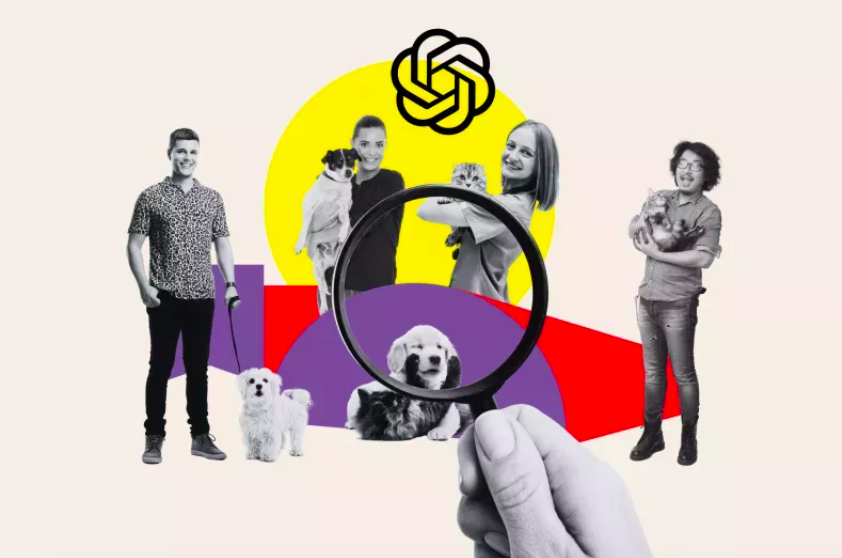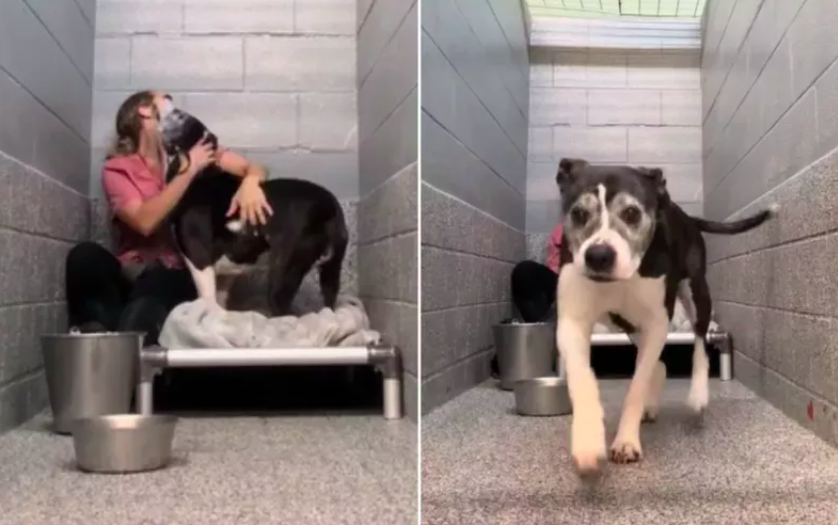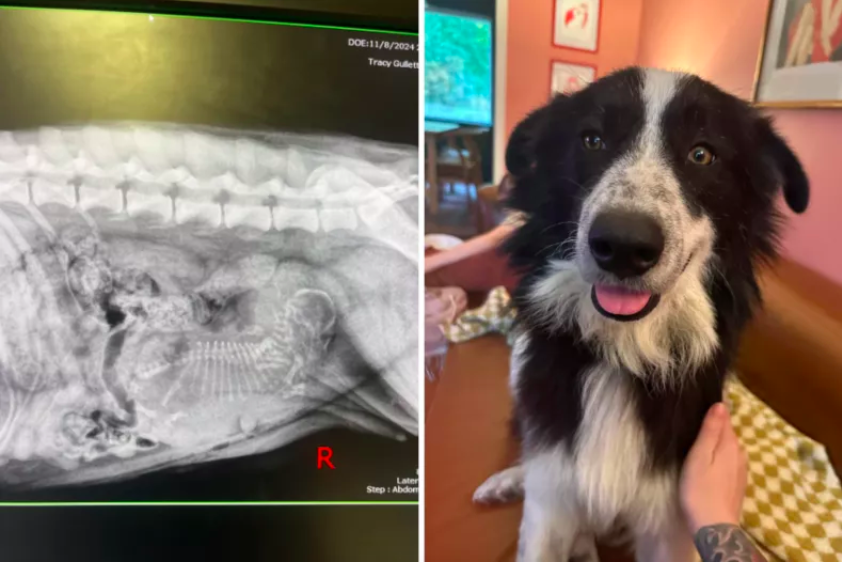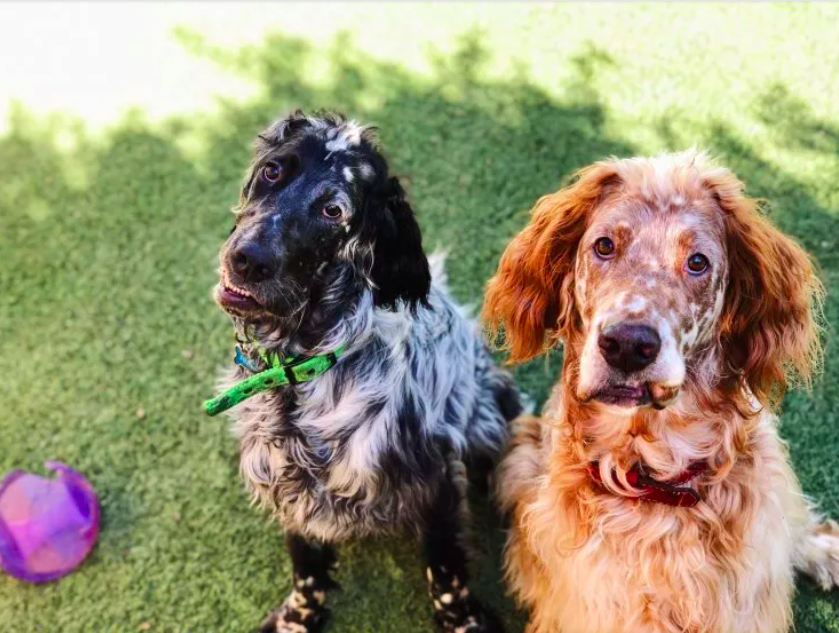Trending Pet Stories
How To Spot a Cat Person vs. a Dog Person, According to ChatGPT

How To Spot a Cat Person vs. a Dog Person, According to ChatGPT
When it comes to pets, people often categorize themselves as either a “cat person” or a “dog person.” These labels go beyond mere pet preferences—they reveal a lot about personality, lifestyle, and even relationship styles. But how can you tell if someone is a cat person or a dog person? In this detailed guide, we’ll explore insights shared by ChatGPT and expand on how these traits manifest in everyday life.
From fashion sense to communication styles, personality traits to home environments, you’ll discover the subtle and not-so-subtle differences between cat and dog lovers. Let’s dive in!
1. Personality Traits of Cat People vs. Dog People
One of the most obvious differences between cat and dog people lies in their personality traits. Cat people are generally seen as more independent, introverted, and thoughtful. They often enjoy quiet activities like reading, drawing, or simply binge-watching their favorite shows. On the other hand, dog people are more extroverted, social, and energetic. They thrive in group settings, love outdoor activities, and are often the life of the party.
Common Personality Traits of Cat People:
- Independent and self-reliant.
- Prefers solo activities.
- Thoughtful and introverted.
- Can appear reserved or introspective.
Common Personality Traits of Dog People:
- Outgoing and extroverted.
- Enjoys group activities.
- Energetic and lively.
- Social and loves being around others.
An interesting note from animal behavior experts suggests that pets often mirror the personalities of their owners. A shy, timid cat could reflect an owner who values alone time, while a playful, energetic dog might be a mirror of a lively, active person.
2. Lifestyle Preferences of Cat vs. Dog People
Cat people tend to live a more relaxed, low-maintenance lifestyle. They appreciate calm environments and prefer activities that don’t require constant attention or interaction. This may mean more time spent at home, surrounded by books or cozy décor.
In contrast, dog people often have a more active and structured lifestyle. You’ll likely find them jogging, hiking, or at the dog park, with a daily routine built around their need for social interaction and outdoor activities.
Lifestyle Indicators of Cat People:
- Prefers quiet, controlled environments.
- Spends more time at home.
- Enjoys hobbies like reading, knitting, or painting.
Lifestyle Indicators of Dog People:
- Enjoys outdoor activities like hiking or running.
- Thrives on routine and structure.
- Loves being in social settings and staying active.
3. Approach to Relationships: How Cats and Dogs Reflect Their Owners
Just like their pets, cat people tend to value personal space and independence. They enjoy deep, meaningful relationships but are comfortable being alone. Cat people often appreciate the importance of boundaries, much like their feline friends.
Dog people, however, are generally more affectionate and expressive in their relationships. They thrive on loyalty, companionship, and frequent interaction, mirroring the loving, enthusiastic nature of their dogs.
Relationship Traits of Cat People:
- Values independence and personal space.
- Seeks deep, meaningful connections.
- Comfortable with alone time.
Relationship Traits of Dog People:
- Loyal and affectionate.
- Enjoys frequent interaction and open displays of affection.
- Seeks companionship and emotional support.
4. Home Environment of Cat vs. Dog People
The differences between cat and dog people extend to how they organize their living spaces. Cat people’s homes are often calm, cozy, and filled with nooks for relaxation. You’ll likely find bookshelves, quiet corners, and minimal clutter, creating a tranquil environment for both the owner and their feline friend.
In contrast, dog people’s homes tend to be more dynamic and playful. Their living spaces often include open areas for their pets to run around, with pet-friendly furniture, toys scattered around, and a layout designed for easy interaction.
Home Characteristics of Cat People:
- Cozy, serene, and organized.
- Decorated with bookshelves and personal touches.
- Spaces for quiet time and relaxation.
Home Characteristics of Dog People:
- Lively and open, with space for activity.
- Pet-friendly furniture and decor.
- Designed for interaction and playtime with their dog.
5. Social Media and Communication Styles
When it comes to social media and communication styles, cat and dog people also have distinct differences. Cat people tend to be more reserved online, often sharing clever, witty posts or artistic photos that reflect their unique perspective. They usually prefer the convenience of texting or emailing over direct phone calls.
Dog people, on the other hand, are more likely to post upbeat, humorous content, often showcasing their dogs in fun, interactive videos. They enjoy phone calls and in-person conversations, reflecting their more extroverted nature.
Social Media Preferences of Cat People:
- Clever, artsy posts.
- Prefers texting or emailing.
- Reserved but thoughtful online presence.
Social Media Preferences of Dog People:
- Humorous and upbeat content.
- Enjoys phone calls and face-to-face conversations.
- Interactive and social online.
6. Reaction to Pets: Observing the Differences
Cat people often appreciate the independent nature of their pets, enjoying the companionship without the need for constant attention. They’re more likely to patiently observe their cat and give them space to come around.
Dog people, however, love the immediate affection and enthusiasm their dogs provide. They enjoy playful interactions, and their dogs’ energetic greetings bring them joy.
Cat People:
- Enjoys quiet companionship.
- Appreciates the independence of their pets.
- Patient and understanding.
Dog People:
- Thrives on playful, interactive behavior.
- Enjoys the enthusiastic affection of their dogs.
- Seeks constant interaction and companionship.
7. Fashion Sense: How Style Reflects Pet Preferences
Even fashion choices can indicate whether someone is a cat person or a dog person. Cat people often prefer stylish yet comfortable pieces, with an emphasis on simplicity and elegance. Their fashion tends to reflect their calm, reserved nature.
Dog people, on the other hand, often lean towards more casual or practical clothing. Athletic wear is common, as their lifestyle involves outdoor activities and frequent movement.
Fashion of Cat People:
- Understated, elegant pieces.
- Comfortable yet stylish.
- Reflects a calm and relaxed demeanor.
Fashion of Dog People:
- Casual or athletic wear.
- Practical and functional.
- Ready for outdoor activities at any moment.
8. Humor and Entertainment Preferences
Humor and entertainment preferences are also influenced by whether someone is a cat or dog person. Cat people often enjoy subtle, clever humor and entertainment that requires thoughtful engagement. They may prefer shows with complex characters or intricate plots.
Dog people, in contrast, enjoy feel-good humor and straightforward entertainment. Comedies, action-packed movies, and lighthearted content are their go-to, reflecting their preference for fun and positive experiences.
Entertainment Preferences of Cat People:
- Subtle, clever humor.
- Prefers thought-provoking shows and movies.
- Engages with content that stimulates reflection.
Entertainment Preferences of Dog People:
- Enjoys lighthearted, feel-good humor.
- Prefers action-packed, straightforward content.
- Looks for entertainment that brings immediate joy.
Conclusion: Which One Are You?
While being a cat person or a dog person is often lighthearted, these preferences do reveal deeper aspects of one’s personality and lifestyle. Whether you’re someone who enjoys quiet, independent moments or thrives on energy and social interaction, there’s no denying that your pet choice says a lot about who you are. Which one resonates with you?
FAQs on Cat People vs. Dog People
Can someone be both a cat person and a dog person?
Yes, many people love both cats and dogs, though they may lean slightly towards one or the other based on their lifestyle or personality traits.
What do cat people and dog people have in common?
Both cat and dog people share a deep love for animals and enjoy the companionship pets provide, though they express this affection differently.
Do cat people prefer quiet over noise?
Generally, yes. Cat people tend to prefer calm, quiet environments where they can relax and enjoy solitary activities.
Are dog people more active than cat people?
On average, dog people tend to lead more active lifestyles due to the nature of dogs needing more exercise and outdoor activities.
Can your pet’s personality mirror your own?
Yes, pets often reflect the personalities of their owners, with cats and dogs adapting to the environment and energy around them.
We appreciate you for taking the time to read this article!
Finally, we hope you found this article interesting? And what do you think about ”Parvo Symptoms: What Every Pet Parent Needs to Know!?”
Please feel free to share or inform your friends about this article and this site, thanks!
And let us know if you observe something that isn’t quite right.
For the original article, visit Newsweek’s article on How to Spot a Cat Person vs. a Dog Person.
Trending Pet Stories
Dog Shelter’s Longest Resident: Grandma’s Sweetest Reaction to a Visitor

Dog Shelter’s Longest Resident: Grandma’s Sweetest Reaction to a Visitor
Introduction: A Heartwarming Tale of Resilience
Animal shelters across the U.S. are filled with dogs longing for forever homes, but few stories are as touching as that of Grandma, a 9-year-old boxer-pit bull mix. As the longest-term resident at Junction City Animal Shelter in Kansas, Grandma’s tale highlights the struggles and incredible love senior dogs offer.
In this article, we explore Grandma’s journey, her charming personality, and the challenges faced by older shelter dogs like her.
Grandma’s Arrival: Abandoned but Not Broken
Grandma’s journey began on November 5, 2023, when she arrived at Junction City Animal Shelter as a stray. Shelter staff later found her previous owner, who could no longer care for her. Vanessa Gray, the shelter director, shared:
“Grandma is an older gal with a nurturing demeanor that inspired her name.”
Despite her difficult start, Grandma quickly endeared herself to the shelter staff with her gentle nature and resilience.
Getting to Know Grandma: A Special Soul
Over time, Grandma revealed her unique personality and preferences:
- Loves Cozy Blankets: Grandma enjoys snuggling up in soft blankets.
- Sunbathing Enthusiast: She relishes roaming the yard and soaking up the sun.
- Playful Companion: From fetch to chew toys, Grandma’s playful side shines.
Her affectionate demeanor and love for human interaction make her a perfect candidate for a loving home.
Why Senior Dogs Like Grandma Face Challenges
Sadly, Grandma’s story isn’t unique. Senior shelter dogs often face longer waits for adoption. A 2021 study in the Animals journal found common traits in long-term shelter residents:
- Older age.
- Larger size.
- Belonging to misunderstood breeds.
- Specific needs, such as being the only pet in the home.
For Grandma, her age, size, and breed have created challenges in attracting adopters.
A Viral Moment: Grandma’s Reaction to a Visitor
Recently, Junction City Animal Shelter shared a video of Grandma on TikTok. The clip shows her joyfully interacting with a staff member, eagerly wagging her tail and playing. The caption, “I’m not crying… you’re crying,” perfectly captures the emotional moment.
This viral footage highlights Grandma’s loving nature and proves she’s still full of life, ready for a family to cherish her.
Life in a Shelter: The Toll on Senior Dogs
Shelter life can be tough for older dogs like Grandma. While she handles the noise and routine better than many, the lack of a permanent home takes its toll. Gray shared:
“This is still not the place for any animal, especially a senior. There is so much noise.”
Fortunately, Junction City Shelter doesn’t euthanize animals, giving Grandma the time she needs to find a family.
What Makes Grandma the Perfect Pet?
Grandma is a loving and low-maintenance companion. Here’s what makes her ideal:
- Solo Star: She thrives in homes without other pets.
- Easygoing Nature: Grandma enjoys her independence but loves human attention.
- Perfect for Any Home: Her calm demeanor makes her suitable for families or individuals.
Advocating for Senior Dogs Like Grandma
Grandma’s story represents countless senior dogs in shelters. Adopting an older dog comes with unique rewards:
- Calm Temperament: Senior dogs are often more predictable and relaxed.
- Deep Bonding: Older dogs form strong emotional connections with adopters.
- Gratitude: They often show immense appreciation for their new homes.
How You Can Help
If you’re moved by Grandma’s story, here are ways to make a difference:
- Adopt: Open your heart and home to a senior dog.
- Volunteer: Spend time with shelter animals to brighten their days.
- Donate: Support shelters with supplies or financial aid.
- Share: Spread the word about adoptable senior pets like Grandma.
Conclusion: Grandma’s Forever Home Awaits
Grandma’s journey is a testament to resilience and unconditional love. As the shelter staff work tirelessly to find her the perfect home, her story reminds us of the joy and companionship senior dogs bring.
Could you be the one to give Grandma the life she deserves? Visit Junction City Animal Shelter to meet her today.
FAQs About Senior Dog Adoption
Why adopt a senior dog?
Senior dogs are calm, loving, and often trained, making them excellent companions.
Are older dogs harder to care for?
While they may require more vet visits, their mature temperament often makes them easier to manage than younger dogs.
Can senior dogs adjust to new homes?
Yes! With patience and love, senior dogs adapt quickly and bond deeply with their families.
What challenges do senior shelter dogs face?
Older dogs often struggle with age-related stigma, breed stereotypes, and limited interest from adopters.
How can I help if I can’t adopt?
You can volunteer, donate, or share stories of senior dogs to raise awareness and support their adoption.
We appreciate you for taking the time to read this article!
Finally, we hope you found this article interesting? And what do you think about ”Dog Shelter’s Longest Resident: Grandma’s Sweetest Reaction to a Visitor!?”
Please feel free to share or inform your friends about this article and this site, thanks!
And let us know if you observe something that isn’t quite right.
References: Newsweek Original Article
Trending Pet Stories
Gift Guide 2024: The Best Gifts for Pet Owners
Trending Pet Stories
Routine Spay Appointment Reveals Shocking Secret About Rescue Dog

Routine Spay Appointment Reveals Shocking Secret About Rescue Dog
When a Tennessee woman decided to spay her newly adopted rescue dog, Salem, she never imagined the twist that would follow. In an unexpected revelation, a routine veterinary procedure unveiled a surprising truth that captivated pet lovers online.
Adopting Salem: A New Beginning
Haley Houghmaster and her family adopted Salem, an Australian shepherd and border collie mix, on October 26, 2024. Salem joined their family from Happy Tails Canine Rescue, a Memphis-based organization dedicated to helping stray and abandoned dogs find loving homes. According to Haley, Salem had seamlessly adjusted to her new surroundings, quickly becoming a beloved member of the household.
A Routine Appointment Turned Extraordinary
On November 3, just over a week after Salem’s adoption, Haley brought her to the vet for a spay appointment. What was supposed to be a standard procedure took an unexpected turn.
Once under anesthesia, the veterinarian made an incision and discovered Salem was heavily pregnant—with only one puppy. Haley shared the surprising news on Reddit, where her story quickly gained traction.
“Found out at spay appointment that my new rescue dog is pregnant with one puppy,” Haley captioned her Reddit post, accompanied by Salem’s X-ray image.
What Are Singleton Puppies?
Singleton puppies, or single-litter puppies, are a rarity in the canine world. According to pet experts, this condition can result from several factors, including a dog’s age, genetics, or environmental influences.
Why Are Singleton Puppies So Rare?
- Breed and Genetics: Certain breeds are more prone to single-litter births due to their genetic makeup.
- Stress and Environment: External stressors can influence the size of a dog’s litter.
- Health and Age: Older dogs or those with unique health conditions are more likely to carry fewer puppies.
Risks Associated with Singleton Births
While the thought of a single puppy might seem adorable, it does come with its challenges.
Potential Complications
- Labor Induction Issues: Typically, puppies induce labor by releasing cortisol. With only one puppy, there might not be enough hormone production, which could delay labor and necessitate a C-section.
- Placental Limits: A dog’s placenta is viable for about 63 days. If labor doesn’t occur by day 65, veterinary intervention becomes critical.
- Socialization Concerns: Singleton puppies may miss out on the crucial social interactions provided by littermates, potentially leading to behavioral challenges.
- Lactation Issues: A single puppy may not trigger sufficient milk production, depriving it of colostrum, the nutrient-rich first milk.
Haley’s Decision: Embracing the Miracle
Despite the risks, Haley decided to let Salem carry the pregnancy to term. Terminating at this stage could have posed significant dangers to Salem’s health.
“Since it’s just one puppy, I chose to keep it and let her try to deliver naturally,” Haley explained.
Salem is expected to deliver any day now, and Haley remains optimistic for a smooth delivery.
Expert Insights on Singleton Puppies
Dr. Harunur Rashid, in an article for Vet Advises, emphasizes that while rare, singleton litters are not unheard of. However, veterinarians need to monitor these pregnancies closely to ensure the safety of both the mother and puppy.
Dr. Marty Greer, a veterinarian at Revival Animal Health, notes that C-sections are often necessary in such cases. Without the natural triggers for labor, complications can arise, putting both mother and pup at risk.
A Viral Sensation: Salem’s Story Captures Hearts Online
Haley’s Reddit post resonated with pet lovers worldwide, garnering over 12,000 upvotes and hundreds of comments.
- “Congrats! She looks like a happy momma-to-be,” one user remarked.
- “What a surprise! We had a similar experience with our rescue,” another shared.
- Some cautioned Haley, noting that X-rays aren’t always precise: “Our vet said two puppies, but we ended up with eight!”
Found out at spay appt that my new rescue dog is pregnant with 1 puppy 😅
byu/Pipsmagee2 inDogAdvice
What’s Next for Salem and Her Puppy?
As Salem approaches her due date, Haley and her family are preparing for the arrival of their newest furry family member. They’re hopeful for an uneventful delivery and are excited to meet the puppy who has already captured so much attention.
Conclusion: A Rescue Dog’s Unexpected Journey
Salem’s story is a heartwarming reminder of the surprises life can bring, even in the most routine situations. Her journey from rescue dog to expectant mother has inspired thousands, showcasing the unpredictable beauty of life.
Frequently Asked Questions (FAQs)
What are singleton puppies?
Singleton puppies refer to litters with only one puppy. This condition is rare and influenced by factors such as breed, genetics, and environment.
Can singleton pregnancies be risky for dogs?
Yes, singleton pregnancies can pose risks, including complications during labor and insufficient milk production for the puppy.
How can vets help singleton pregnancies?
Veterinarians closely monitor singleton pregnancies and often recommend C-sections if natural labor doesn’t begin within the expected timeframe.
Why do singleton puppies face socialization issues?
Without littermates, singleton puppies may miss out on critical interactions that help develop their social and behavioral skills.
What should owners of singleton puppies do?
Owners should provide extra care, socialization opportunities, and veterinary checkups to ensure the puppy’s physical and emotional well-being.
We appreciate you for taking the time to read this article!
Finally, we hope you found this article interesting? And what do you think about ”Routine Spay Appointment Reveals Shocking Secret About Rescue Dog!?”
Please feel free to share or inform your friends about this article and this site, thanks!
And let us know if you observe something that isn’t quite right.
References: the original article on Newsweek.
-

 Pet Care2 years ago
Pet Care2 years agoThe Best Dog Collars For 2022
-

 Dogs2 years ago
Dogs2 years agoBichon Frise: The Happy, Playful, and Cuddly Companion
-

 Trending Pet Stories1 year ago
Trending Pet Stories1 year ago2023 ‘World’s Ugliest Dog’ Winner: Scooter’s Tale of Resilience
-

 Animals3 years ago
Animals3 years agoAre There Animals Having Down Syndrome?
-

 Pets2 years ago
Pets2 years agoThe Fascinating World Of The Red Chameleon
-

 Dogs3 years ago
Dogs3 years agoTop 10 Most Popular Dog Breeds According To AKC.
-

 Dogs3 years ago
Dogs3 years ago21 Dog Breeds That Resemble Bears Or Teddy Bears!
-

 Dogs3 years ago
Dogs3 years agoEskimo Dogs from Canada – What Are They? – Find Out!










